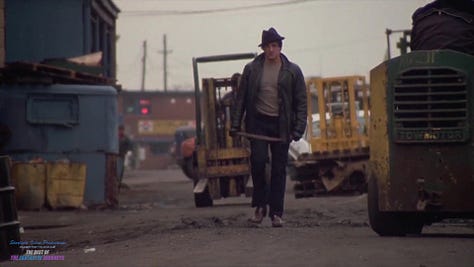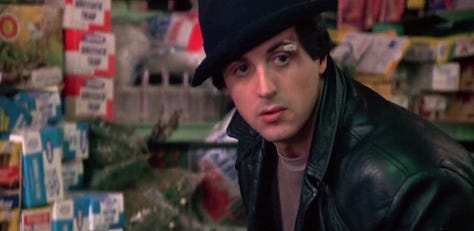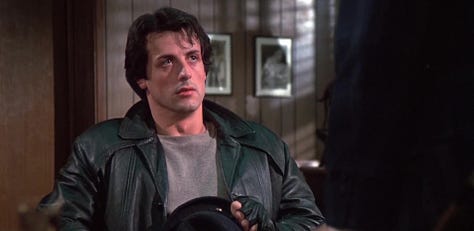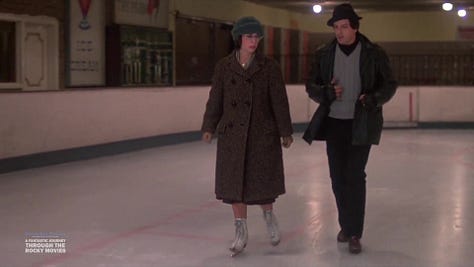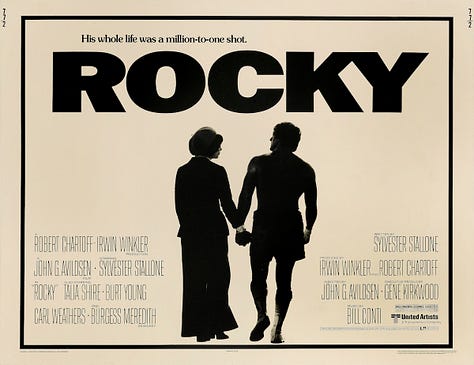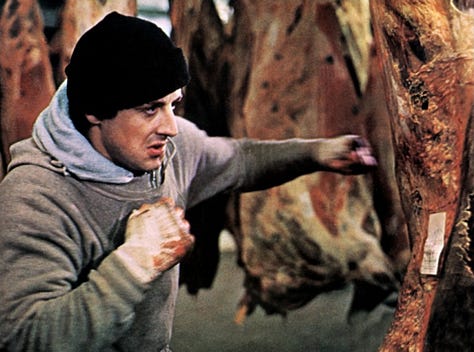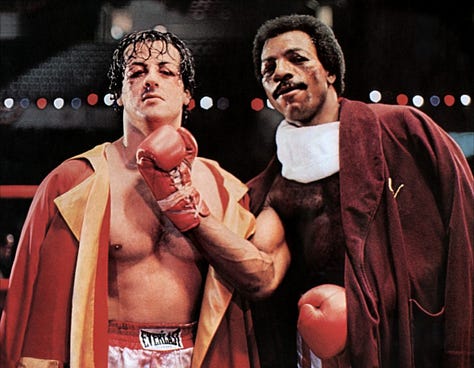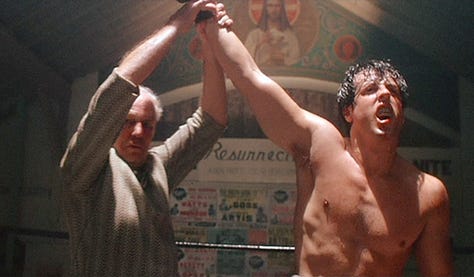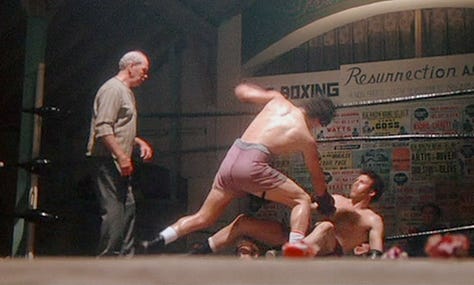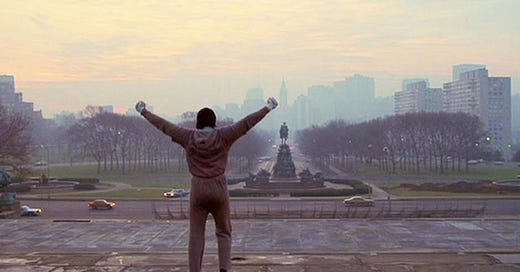ROCKY
1976 • John G. AvildsenCast: Sylvester Stallone, Talia Shire, Burt Young, Carl Weathers, Burgess Meredith, Thayer David, Joe Spinell, Tony Burton
Screenplay: Sylvester Stallone
Cinematography: James Crabe
Music: Bill Conti
Producers: Irwin Winkler, Robert Chartoff
United Artists
All I wanna do is go the distance. Nobody's ever gone the distance with Creed, and if I can go that distance, you see, and that bell rings and I'm still standin', I'm gonna know for the first time in my life, see, that I weren't just another bum from the neighborhood.
Yo, Adrian. If you live in America and somehow haven’t seen it, Rocky follows the story of Rocky Balboa, a small-time boxer from Philadelphia with a job as a debt collector for a loan shark. Despite his tough exterior, Rocky is a sensitive soul, pining after the affections of the shy pet shop clerk, Adrian. His life takes an unexpected turn when the heavyweight champion of the world, Apollo Creed, decides to give an unknown fighter a shot at the title. Creed selects Rocky as his opponent for a highly publicized match on New Year's Day. As the date of the big fight approaches, Rocky immerses himself in intense training, pushing his physical and mental limits to prepare for the opportunity of a lifetime. The climactic showdown between Rocky and Apollo is a David vs Goliath underdog bout of perseverance, symbolizing the mythical American Dream.
Rocky stands as a testament to the power of an underdog story, and its initial impact was driven by factors that often surprise those who have been influenced by its sequels. While the subsequent films in the Rocky franchise, especially those from the 1980s, are remembered for their flashy bombast, coming off like an MTV video, the original film, directed by John G. Avildsen and written by Stallone himself, took a different approach. Filmed on a modest budget, Rocky is really a gritty character drama set against the backdrop of blue-collar Philadelphia. Stallone’s Rocky Balboa defied the conventions of typical Hollywood leading men. Unlike the chiseled and glamorous protagonists of mainstream cinema, Rocky is a working-class everyman, scraping by as a collector for a loan shark. (Of course, with some time and a little money, Stallone himself would become the chiseled and glamourous leading man in the 1980s.) The film's grittiness often surprises those who are more familiar with the sometimes cheesy sequels. The narrative isn't dominated by over-the-top training montages (though it has a GREAT one), but instead focuses on the intimate struggles of a man yearning for significance in a world that seems to have overlooked him. The heart of the story lies in Rocky's personal journey: his dreams, his relationship with Adrian, the broken dreams he left behind, and the confrontation of his own physical limitations.
The underdog theme is not just a trope in Rocky, it's the soul of the whole film. Rocky Balboa's chance at a heavyweight title shot against Apollo Creed is less about the boxing spectacle and more about the opportunity for a seemingly ordinary person to transcend his circumstances. Rocky, when offered the fight, initially refuses. The thought terrifies him. He knows he doesn’t have a chance against the greatest boxer in the world. He has to be convinced by the fight promoter, who only sees dollar signs and doesn’t care if Rocky gets his head caved in. Apollo, seeing the fight as just a gimmick, doesn’t take Balboa seriously. He borderline mocks him at the press conference. Rocky, knowing this is his only chance to do anything with his life, takes the opportunity incredibly seriously. The training montages aren’t just montages, they serve as Rocky’s middle finger to Apollo, to the fight promoter, and even to Mickey, his trainer, who had given up on his potential… it’s his middle finger to everyone who ever told him he couldn’t do it. This is why the film struck a chord with audiences.
Sylvester Stallone's journey in getting the film to the big screen mirrors Rocky Balboa’s challenge against Apollo Creed: a compelling tale of perseverance, determination, and the relentless pursuit of a dream. Prior to his breakthrough, Stallone had struggled as a bit actor in the industry for years, taking on small and often unnoticed roles. His career was far from glamorous, and he found himself grappling with the challenges that many aspiring actors face… rejections, financial hardships, and the constant uphill battle for recognition. Stallone's inspiration for Rocky came from a 1975 boxing match between Chuck Wepner and World Heavyweight Champion Muhammad Ali. Wepner wasn’t a match for Ali, but he managed to go the distance against the legendary Ali, going 15 rounds with the champ. Determined to tell the story of an ordinary man's extraordinary chance at greatness, Stallone has said in interviews that he isolated himself in his apartment, blocking out the outside world by covering the windows, emerging only when the script was complete. When selling the screenplay, Stallone insisted on starring in the film as Rocky Balboa. This condition was a bold choice, Cotton, considering his relative obscurity in the industry. Hollywood was hesitant to cast an unknown actor in the lead role of a major motion picture. However, Stallone, much like his on-screen counterpart, saw this as his one-in-a-million chance, and he was determined to make the most of it. The gamble paid off when the producers agreed to his terms. The bluff clearly paid off.
The opening theme and the first shot of Rocky create a paradox that sets the tone for the entire film. The paradox lies in the juxtaposition of the triumphant and iconic music with the visual introduction of the main character in a decidedly unglamorous setting. Instead of opening with a glamorous portrayal of the protagonist, the audience is introduced to Rocky Balboa in a dark and dingy boxing club. It’s dirty, and poorly lit, with maybe two or three dozen spectators. You can almost smell the urine and stale beer. Rocky is a small-time boxer scraping by, and the contrast between this gritty reality and the grandiosity of the opening score creates a fascinating dichotomy. This choice serves to humanize Rocky from the outset, bringing him down to a level audiences can connect with. It can only go up from here.
The difference between the first and last fights encapsulates Rocky’s journey. These two bouts, each with its distinct context and emotional weight, mirror Rocky's personal growth. His first fight in the film is against Spider Rico, painting a picture of the unglamorous nature of Rocky's boxing career at this point. This initial fight is a glimpse into Rocky's everyday life, reflecting the harsh reality of his existence. The match itself is not a grand spectacle; instead, it is a gritty, bare-knuckled struggle. Rocky wins, but it's a victory that barely registers beyond the confines of the local boxing scene. The atmosphere is far from celebratory, perhaps best exemplified by Rocky slumped over in the locker room, smoking a cigarette. Contrastingly, the final fight in the film is the climactic showdown against Apollo Creed, the heavyweight champion of the world. This bout takes place in the illustrious Philadelphia Spectrum, a significant venue that elevates the stakes to a global scale. The setting is grand, and the event is a major spectacle, capturing the attention of the entire nation. Rocky's journey from obscurity to this grand stage is a testament to his resilience. The final fight is not merely a boxing match; it is the culmination of Rocky's perseverance, his desire to go the distance. The contrast between the modest beginning and the extravagant finale emphasizes the enormity of Rocky's achievement and the profound impact of his journey.
Bill Conti's now-famous "Gonna Fly Now" theme, with its uplifting horns and energetic beat, is synonymous with the spirit of triumph and accomplishment. It is a musical motif that has become inseparable from the image of Rocky Balboa ascending the steps of the Philadelphia Museum of Art. The theme is a powerful anthem and is a pop culture staple. Bill Conti’s score is more than just the Rocky steps. It is slow and melancholic during Rocky’s more introspective scenes. It’s fast and exciting during the boxing sequences. And with the “Final Bell” track, it urges you to stand on your feet and root for Rocky to stay on his feet for one more second. It is one of the most inspirational scores of all time.
Rocky, the film and the man, would be nothing without the supporting cast. Each of them serves as a symbolic representation of different themes and emotions. Mickey (Burgess Meredith), is Rocky's grizzled and tough-as-nails trainer. Mickey's character embodies redemption. A former boxer himself, Mickey sees in Rocky the opportunity for a second chance. Throughout the film, Mickey's gruff exterior hides a genuine desire to see Rocky succeed, not only in the boxing ring but also in life. He represents the idea that redemption is always possible, no matter how rough the past may have been. Mickey becomes a mentor figure, pushing Rocky to overcome his own doubts and to seize the opportunity that life presents. Mickey's redemption story is subtle but poignant. His belief in Rocky's potential reflects his own desire for vindication and a chance at a legacy that extends beyond the forgotten pages of boxing history.
Paulie, Rocky's best friend and Adrian’s brother, is played by the late Burt Young. Paulie's character represents the darker side of human emotions, particularly jealousy and resentment. He grapples with feelings of inadequacy and envy, especially as he witnesses Rocky's rise to prominence. Paulie's frustration with his own circumstances leads him to act out. His flaws serve as a counterpoint to Rocky's optimism, highlighting the struggles that people face when those around them achieve success.
Adrian (Talia Shire) is Rocky's love interest and represents faith and hope, providing Rocky with emotional support and stability. Adrian's initially shy and reserved demeanor transforms as she witnesses Rocky's determination and sees beyond his tough exterior. She becomes the pillar of strength in Rocky's life, reinforcing the film's theme that success is not solely measured in victories in the boxing ring. Adrian's journey mirrors Rocky's in some ways. Her faith in him, despite his flaws and the odds stacked against him, symbolizes the power of belief and love. Their relationship becomes a source of inspiration for both characters, showcasing the impact that genuine support and unwavering faith can have on an individual's journey.
Rocky as we’ve covered, spawned many, many sequels. Some great, some not so great. But the original stands as a classic, serving as a reminder that first impressions can be deceiving, much like the character himself. Beyond its iconic theme music and the image of a triumphant boxer on the steps of the Philadelphia Museum of Art, the film is a nuanced exploration of human resilience and dreams. Its enduring legacy lies not only in the cultural impact of the franchise but in the unexpected depth and authenticity of the character-driven drama that started it all.
- It's Thanksgiving.
- Yeah, to you it's Thanksgiving; to me it's Thursday.
Notable Awards & Accomplishments
Academy Award Winner: Best Picture
Academy Award Winner: Best Director
Academy Award Nominee: Best Actor (Stallone)
Streaming: Prime, Max, DirecTV
Digital Rental/Purchase: Available at most major digital retailers
Physical Media: Available on 4K, Blu-Ray and DVD
